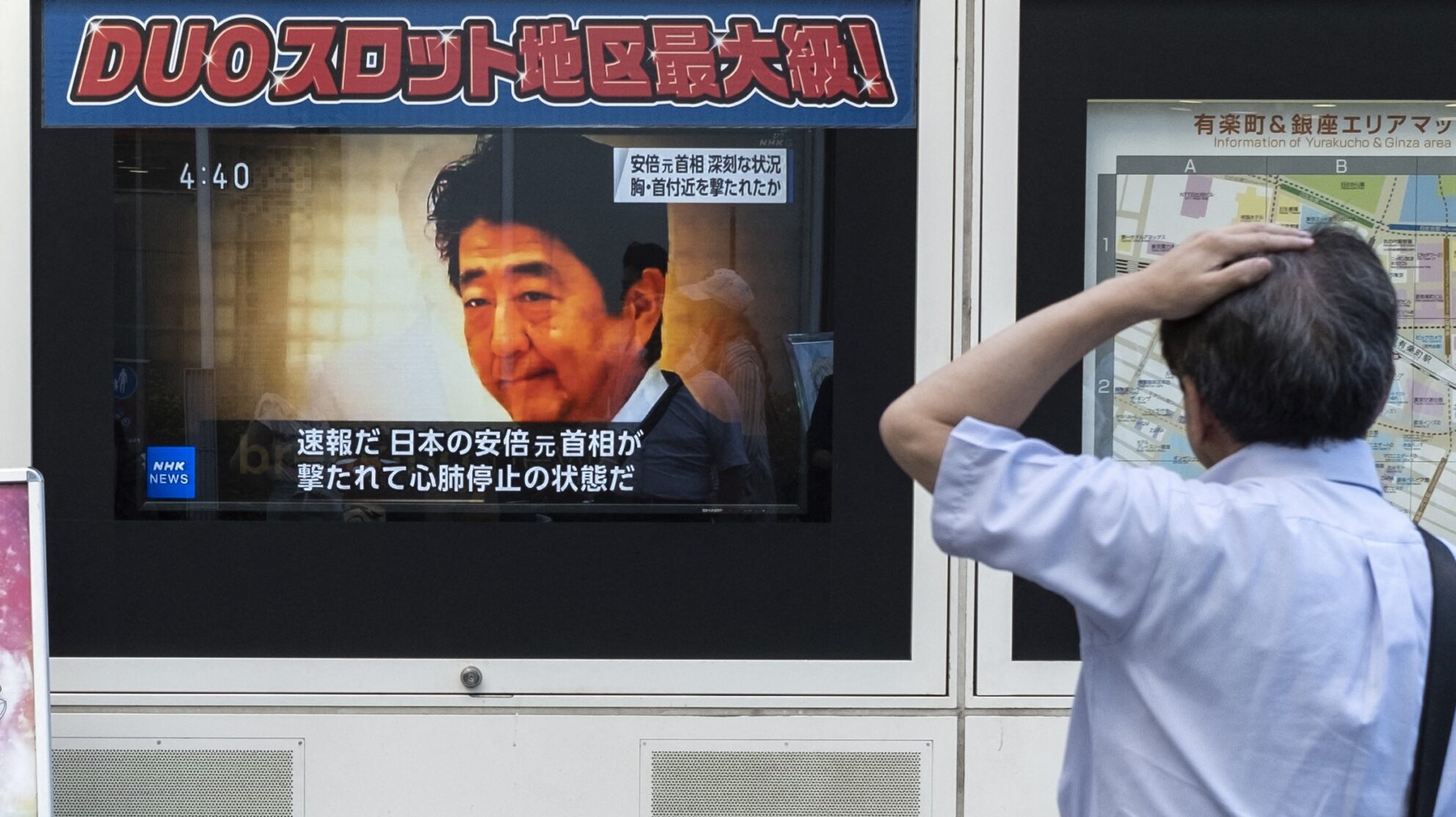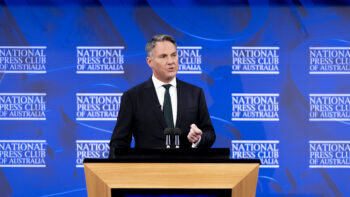
A man looks at a television broadcast showing news about the attack on former Japanese prime minister Shinzo Abe earlier in the day, along a street of Tokyo on July 8, 2022. (Photo by CHARLY TRIBALLEAU/AFP via Getty Images)
SYDNEY: The grim news of former Japanese Prime Minister’s Shinzo Abe’s death at the hands of an assassin rocketed around the Pacific this afternoon, sparking sorrow and encomiums for perhaps Japan’s best-known politician of the last 50 years.
“I cannot find words to describe how I feel,” Japanese Prime Minister Fumio Kishida said, fighting back tears after Abe’s death. “This barbaric, malicious act in the middle of an election cannot be tolerated.”
The attack by a lone assassin, using what was clearly a hand-made weapon, was an attack on “the very foundation of democracy,” Kishida said. Abe was campaigning to increase turnout for his Liberal Democratic Party when he was killed. The election, only for Japan’s upper house, was scheduled for Sunday. Observers believe it was to be a key test of Kishida’s support in the party and ability to lead Japan.
A top expert on Japanese politics and national security, Rikki Larsen, said Abe’s death is likely to greatly boost support for the LDP.
“They will romp home even in seats they were going to give up on,” said Larsen, an honorary professor at the Australian National University.
And Abe’s death may lead to something he supported for years: amending the pacifist clauses in the Japanese constitution. The LDP and other parties have supported changing some of the constitution, though exactly what changes they might agree to remains unclear. The coalition of parties likely to support the change needs 82 votes. “It might give them impetus to change the constitution,” Larsen said.
All this makes it even more certain that Japan will double its defense spending from just under 1% of its GDP to 2%, as the party’s recent strategy paper proposed. That could send ripples across the Pacific. China is certain to react negatively, but the question is, how will the two long-time rivals and enemies manage the friction.
Larsen said that just hours after the attack, China is still trying to decide how to best manage western reaction to Abe’s death. While Chinese leaders may see Abe’s death as removing a persistent challenge to their hegemony, “they are trying to walk the tightrope” as they craft a reaction. They do not want a result, Larsen said, similar to what happened after the 2004 attempted assassination of a pro-independence Taiwanese presidential candidate. That attempt may have tipped the scales to supporters of Taiwanese independence. But, Larsen says China’s focus this time is entirely on ensuring they react in ways that best influence the West.
The initial reaction from China’s Global Times predictably worried that “Japanese right-wing forces may use this incident to push forward the trend of conservative transformation in Japanese politics, and Abe’s supporters will continue to promote ‘free and open Indo-Pacific’ and his other policies, bringing more security risks to the geopolitics of Northeast Asia, according to analysts.”
The paper also focused on the boost this might give the LDP in the election, quoting experts who basically said Japan is a militaristic society that may “return to the path of war.”
Meanwhile Japan’s allies and partners reacted with grief and sympathy for the Japanese people.
Australian Prime Minister Anthony Albanese said he was “shocked and saddened” by the “tragic” death. “Mr Abe was a giant on the world state – a leader in the G7, the G20 and the United Nations, Albanese said. “His legacy was one of global impact and a profound and positive one for Australia.”
Taiwan’s President Tsai Ing-wen said his country “lost an important and close friend. Taiwan and Japan are both democratic countries with the rule of law, and our government severely condemns violent and illegal acts.”
Leaders at the G-20 meeting in Bali, Indonesia reacted to the news with similar comments.
Textron, Leonardo bank on M-346 global experience in looming race for Navy trainer
“The strength we think we bring is that [the Navy is] going to go from contract to actually starting to turn out students much quicker than any other competitors,” a Textron executive told Breaking Defense.



























